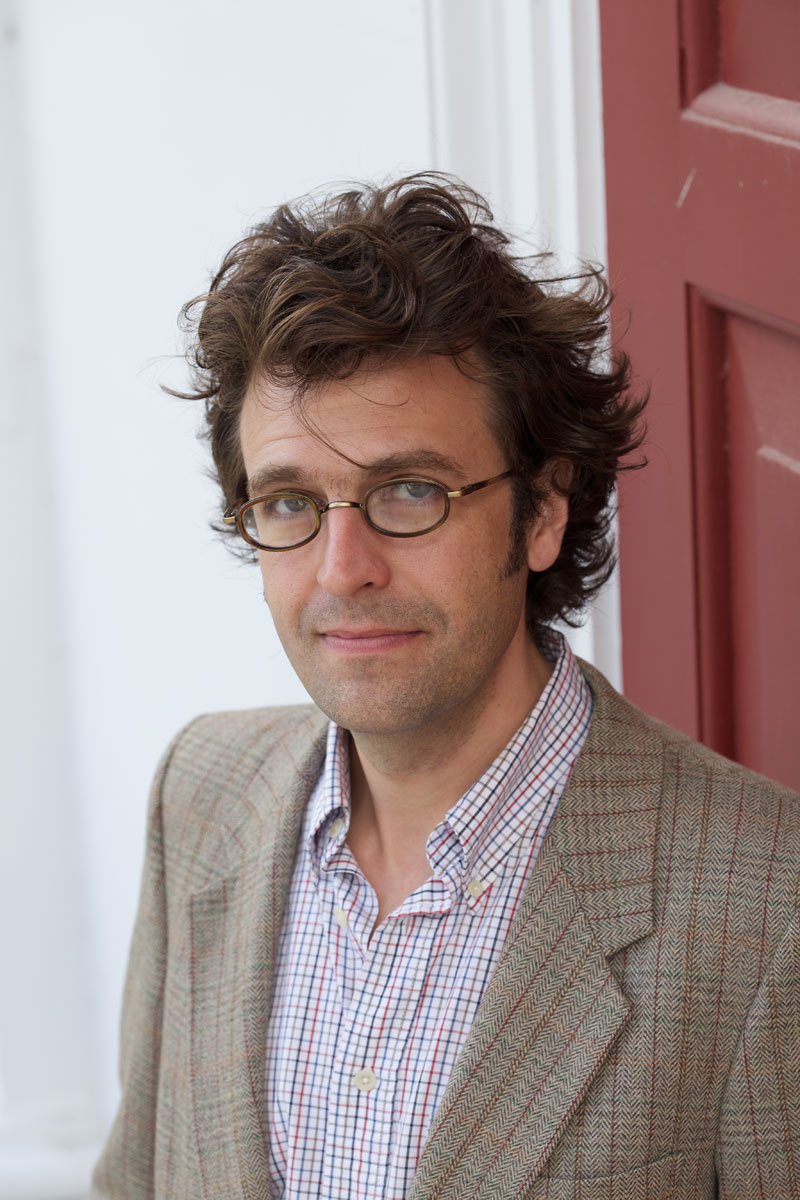Third Time’s the Charm
Ian Bickford has been a student and a professor at Simon’s Rock. Now he’s back a third time – for the biggest adventure yet.
The office of Ian Bickford ‘95 is a work-in-progress. Located on the second floor of the Hall College Center
at Bard College at Simon’s Rock, it has bare walls and just a few books on the shelf.
But its sparseness makes sense: Ian returned to his alma mater just four months ago,
to launch a new initiative called Bard Academy at Simon’s Rock. And almost every moment
since has been reserved for developing the curriculum – a 9th and 10th grade program
designed and taught by college faculty – and to recruiting its first class. 
“I got here in August and dove right in,” Ian says, apologizing for the bare office with a broad smile. With hair like Bob Dylan and a tweedy jacket, he looks like a cross between a musician and academic, perhaps appropriate for a scholar who, he says, enjoys challenging conventions and categories.
“Like most Rockers, I’m interested in the margins and the peripheries,” he says. “One of the effects of choosing, at a young age, to jump the rails of the American education system is to always question norms.”
For Bickford, norm-questioning and margin-exploring have taken a variety of forms. As a teenager, it meant leaving a high school on a military base in Puerto Rico to attend Simon’s Rock. As a PhD student at Stanford and then at the City University of New York, it meant focusing on the English poet John Milton’s influence in America – a non obvious pursuit given that Milton died about a century before the revolution. And as an educator, it’s meant seeking out places he can work with teenagers, but at a college level.
“It’s such a specific periphery,” he says. “I wanted to teach college but I wanted to teach younger students.”
Those specific teaching interests drew him to the burgeoning Bard High School Early College movement. After two years as a visiting professor at Simon’s Rock, he became a professor at BHSEC Queens in 2009, that institution’s second year of existence. He quickly realized he had found his teaching niche and that he also enjoyed the excitement and creativity that come in an institution’s early years. So he and his wife settled into the Bronx, buying a house and gathering a menagerie of pets.
Bickford thought he might be there to stay until he got a call last summer, offering him a chance to help create a 9th and 10th grade program at Simon’s Rock.
Provost Peter Laipson says Bickford was a natural choice to lead the Academy venture, given his experience at both Simon’s Rock and the BHSECs. “He knows Simon’s Rock as both a student and a faculty member, and enjoys the respect of colleagues here,” says Laipson. “He’s also a gifted and experienced educator, and an excellent listener. I believe Ian can hear both the ideas and the concerns of a wide constituency – students, faculty, alumni – and draw on them to build a great program.”
Bard Academy, a 9th and 10th grade boarding and day college-preparatory program will open its doors on the Simon’s Rock campus in 2015. Classes will be designed and taught by college professors, and students will enjoy the same close individual attention and small classes they would at the college – but with dedicated housing, and closer supervision.
As Bickford sees it, the new program doesn’t represent a change in Simon’s Rock mission so much as a way of taking responsibility for one of its core claims: That high school, for many students, just goes on too long.
“Early college is great and radical, but if you’re saying students should start early you’re also saying high school should be shorter,” Bickford says. “For a lot of our students, high school is just something they’re trying to forget and it shouldn’t have to be that.”
With less than a year before the first students arrive, Bickford is busy. He is either on the road, holding receptions at middle schools, or on campus working with Simon’s Rock faculty to create the academic program from the ground-up. For example, he says, the science faculty determined that the biology-chemistry-physics sequence offered by virtually every high school was neither the only nor the best way to teach essential skills.
“What our scientists said is, you need a strong foundation in math, and you need a deep inculcation in scientific method and assumptions of scientific inquiry,” says Bickford. “So, an example of the science courses they’re designing are themed classes on climate change, and on the science of food, that blend biology, chemistry, physics, and environmental science.”
He is excited that several students have already expressed strong interest in joining the Academy’s first ninth grade – both because it makes the whole prospect feel real and because the eighth graders (and eighth-grade parents) willing to take a chance on a brand-new school are exactly the kind of norm-challenging students with whom he feels at home.
“They have to be curious about what the world is,” he says of the students he thinks the Academy will best serve. “They can’t assume that education is just a path to a career. Not that it isn’t - it is.”
“But,” he cautions. “It can’t be only that."